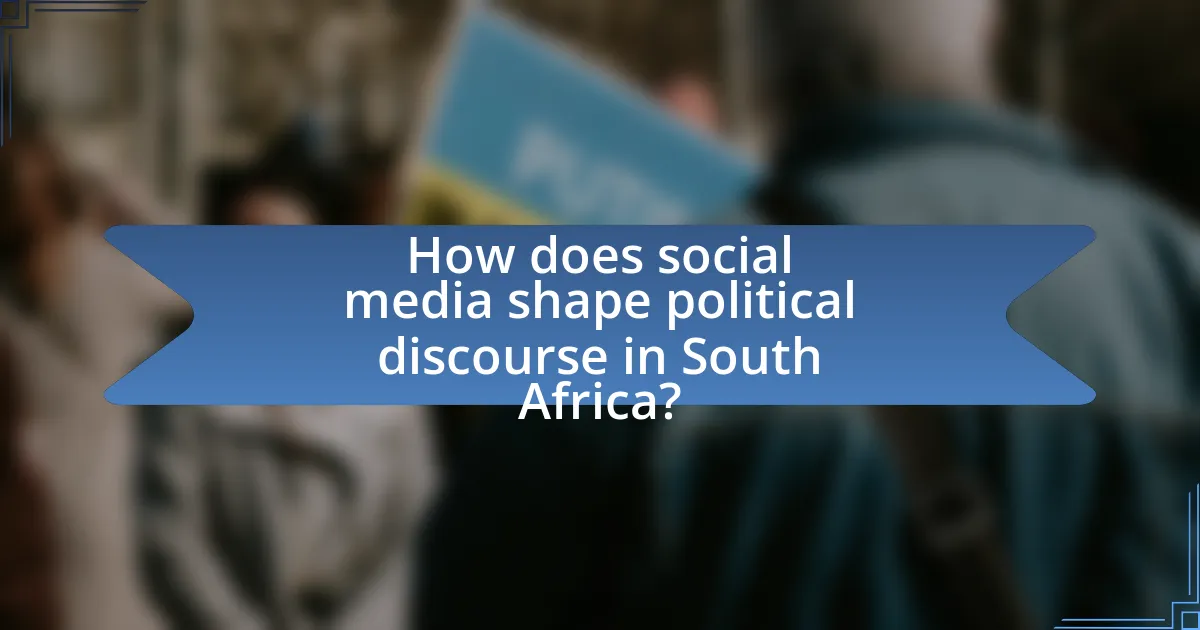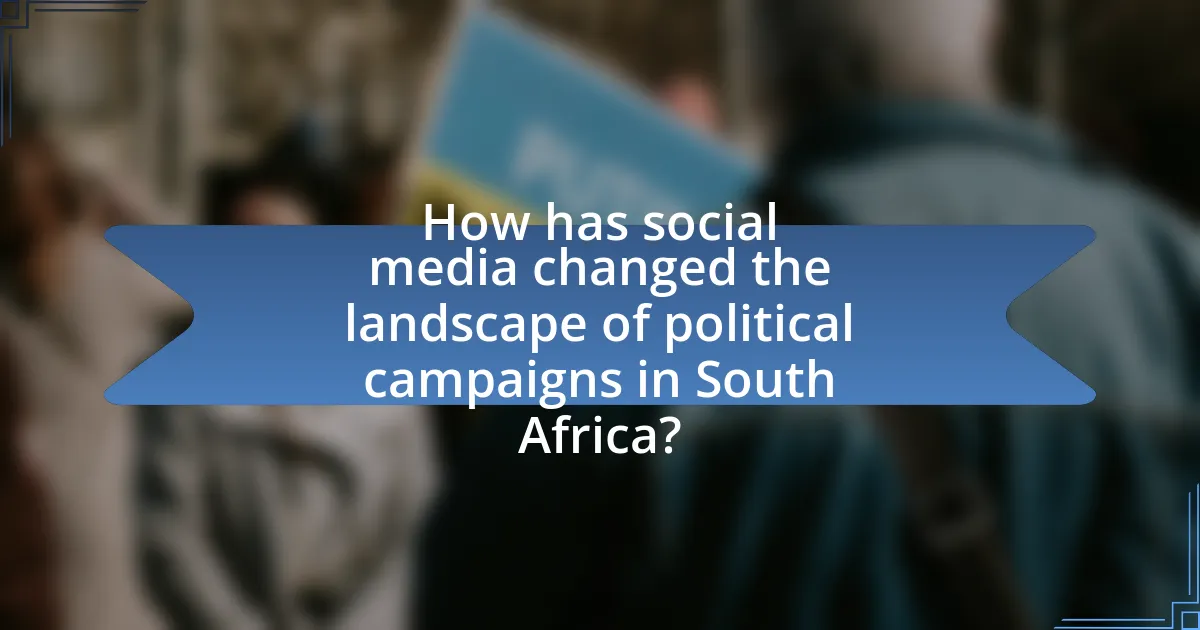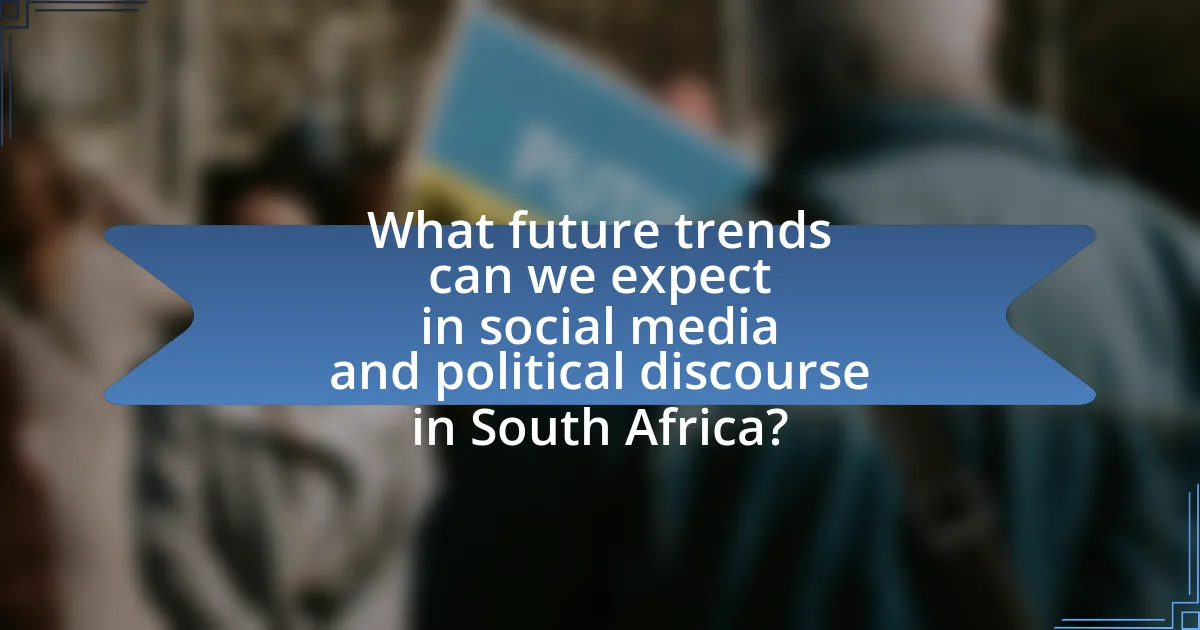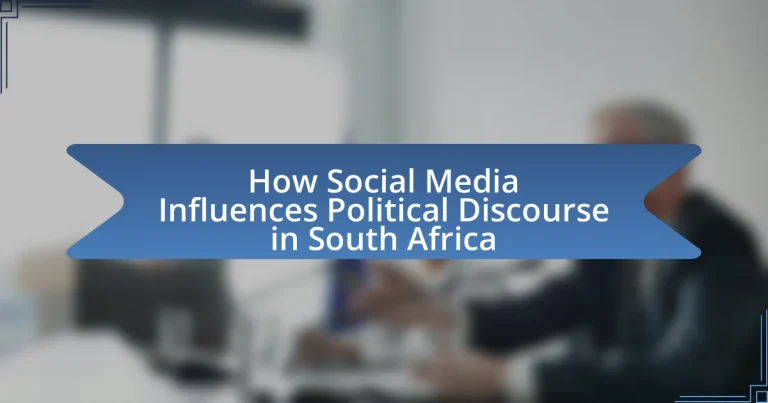The article examines how social media shapes political discourse in South Africa, highlighting its role in facilitating diverse voices and real-time engagement among citizens and political figures. It discusses the impact of social media on political communication, voter behavior, and public participation, particularly among younger demographics. Key themes include the characteristics of political content on social media, the challenges posed by misinformation and polarization, and the strategies employed by political parties during campaigns. The article also explores future trends and ethical considerations surrounding social media use in politics, emphasizing the need for responsible engagement and constructive dialogue.

How does social media shape political discourse in South Africa?
Social media significantly shapes political discourse in South Africa by providing a platform for diverse voices and facilitating real-time engagement among citizens and political figures. This dynamic allows for the rapid dissemination of information, enabling users to share opinions, mobilize support, and challenge traditional media narratives. For instance, during the #FeesMustFall movement, social media was instrumental in organizing protests and amplifying student voices, demonstrating its power in influencing public opinion and political action. Additionally, research from the University of Cape Town indicates that social media platforms have become critical in shaping political awareness and participation, particularly among younger demographics, who are more likely to engage with political content online.
What role do social media platforms play in political communication?
Social media platforms serve as critical tools for political communication by enabling direct interaction between politicians and the public. These platforms facilitate the rapid dissemination of information, allowing political messages to reach a wide audience instantly. For instance, during the 2019 South African elections, social media was pivotal in shaping voter perceptions and mobilizing support, with over 60% of South Africans using platforms like Facebook and Twitter for political engagement. This direct communication channel empowers citizens to participate in political discourse, share opinions, and organize movements, significantly influencing public opinion and political outcomes.
How do different platforms influence the way political messages are shared?
Different platforms significantly influence the way political messages are shared by shaping the format, reach, and engagement of the content. For instance, Twitter’s character limit encourages concise messaging and rapid dissemination, making it effective for real-time political updates and mobilization, as evidenced by the use of hashtags during political protests in South Africa. In contrast, Facebook allows for longer posts and multimedia content, fostering in-depth discussions and community building around political issues, which has been shown to enhance voter engagement in local elections. Additionally, platforms like WhatsApp facilitate private group discussions, enabling grassroots organizing and the sharing of information among trusted networks, which can amplify political messages in a more personal context. These platform-specific characteristics dictate not only how messages are crafted but also how they resonate with different audiences, ultimately affecting political discourse and participation.
What are the characteristics of political content on social media?
Political content on social media is characterized by its immediacy, engagement, and polarization. Immediacy refers to the rapid dissemination of information, allowing users to access real-time updates on political events and issues. Engagement is evident through interactive features such as comments, shares, and likes, which facilitate discussions and mobilize support or opposition. Polarization occurs as political content often reinforces existing beliefs, leading to echo chambers where users are exposed primarily to viewpoints that align with their own. Research indicates that social media platforms can amplify divisive content, influencing public opinion and political behavior, particularly in contexts like South Africa, where diverse political views coexist.
Why is social media important for political engagement in South Africa?
Social media is important for political engagement in South Africa because it serves as a vital platform for communication and mobilization among citizens. In a country with a diverse population and a history of political activism, social media enables individuals to share information, organize protests, and engage in discussions about governance and policy. For instance, during the #FeesMustFall movement, social media played a crucial role in mobilizing students across universities, demonstrating its effectiveness in facilitating collective action. Additionally, research by the Pew Research Center indicates that a significant portion of South Africans use social media to access news and political content, highlighting its role in shaping public opinion and political discourse.
How does social media facilitate public participation in politics?
Social media facilitates public participation in politics by providing platforms for individuals to express their opinions, mobilize support, and engage in discussions about political issues. These platforms, such as Twitter and Facebook, enable users to share information rapidly, organize events, and create movements, which can lead to increased voter turnout and civic engagement. For instance, during the 2019 South African elections, social media campaigns significantly influenced voter behavior, with a reported 80% of young voters using these platforms to gather information and discuss political matters. This demonstrates that social media not only amplifies voices but also fosters a more informed and active citizenry in the political landscape.
What demographic trends are evident in social media political engagement?
Demographic trends in social media political engagement in South Africa show that younger individuals, particularly those aged 18 to 34, are more active in political discussions online compared to older age groups. Research indicates that this age group utilizes platforms like Twitter and Facebook to express political opinions and mobilize for causes, reflecting a shift in political engagement methods. Additionally, studies reveal that urban residents are more likely to engage politically on social media than those in rural areas, highlighting a disparity in access and usage. Furthermore, gender analysis shows that women are increasingly participating in online political discourse, with a notable rise in female-led movements on social media platforms. These trends underscore the evolving landscape of political engagement in South Africa, driven by demographic factors such as age, location, and gender.
What challenges does social media present to political discourse?
Social media presents several challenges to political discourse, including the spread of misinformation, polarization, and the amplification of extreme viewpoints. Misinformation can rapidly circulate on platforms like Twitter and Facebook, leading to public confusion and misinformed opinions, as evidenced by studies showing that false information spreads six times faster than true information. Polarization occurs as users often engage with content that reinforces their existing beliefs, creating echo chambers that hinder constructive dialogue. Additionally, algorithms prioritize sensational content, which can amplify extreme viewpoints and drown out moderate voices, further complicating the political landscape. These factors collectively undermine informed debate and democratic engagement in South Africa’s political discourse.
How does misinformation affect political discussions on social media?
Misinformation significantly distorts political discussions on social media by spreading false narratives that can influence public opinion and voter behavior. Research indicates that misinformation can lead to polarization, as individuals are more likely to engage with content that aligns with their pre-existing beliefs, thereby reinforcing echo chambers. A study by the Pew Research Center found that 64% of Americans believe fabricated news stories cause confusion about basic facts, which can undermine trust in legitimate sources and institutions. This erosion of trust complicates constructive political dialogue and can lead to increased hostility among differing political factions.
What are the implications of echo chambers in political discourse?
Echo chambers in political discourse lead to increased polarization and reduced exposure to diverse viewpoints. This phenomenon occurs when individuals engage primarily with information that reinforces their existing beliefs, limiting their understanding of opposing perspectives. Research indicates that social media platforms, such as Facebook and Twitter, facilitate these echo chambers by using algorithms that prioritize content aligned with users’ preferences, thereby creating a feedback loop of similar opinions. A study by the Pew Research Center found that 62% of social media users encounter mostly like-minded individuals, which exacerbates divisions and hinders constructive dialogue. Consequently, echo chambers can undermine democratic processes by fostering misinformation and reducing the potential for consensus-building in political discussions.

How has social media changed the landscape of political campaigns in South Africa?
Social media has significantly transformed the landscape of political campaigns in South Africa by enabling direct communication between politicians and voters. This shift allows political parties to engage with constituents in real-time, fostering a more interactive and participatory political environment. For instance, during the 2019 national elections, the African National Congress (ANC) and the Democratic Alliance (DA) utilized platforms like Twitter and Facebook to disseminate their messages and mobilize support, reaching millions of users quickly. According to a study by the University of Cape Town, 70% of South African voters reported using social media to follow political news, highlighting its role in shaping public opinion and influencing electoral outcomes.
What strategies do political parties use on social media?
Political parties in South Africa utilize various strategies on social media to engage voters and influence political discourse. These strategies include targeted advertising, where parties use data analytics to reach specific demographics with tailored messages, enhancing voter engagement. Additionally, parties employ real-time communication to respond to current events and public sentiment, allowing them to shape narratives quickly. They also leverage user-generated content by encouraging supporters to share their messages, amplifying their reach organically. Furthermore, political parties often collaborate with influencers to tap into broader audiences, increasing their visibility and credibility. These strategies are supported by the high penetration of social media in South Africa, where over 25 million people are active users, making it a critical platform for political engagement.
How do political parties tailor their messages for different platforms?
Political parties tailor their messages for different platforms by adapting content to fit the unique characteristics and audience expectations of each medium. For instance, on social media platforms like Twitter, parties often use concise, impactful language and visuals to engage users quickly, while on Facebook, they may share longer posts that allow for more detailed narratives and community interaction. Research indicates that political communication strategies vary significantly across platforms; a study by the Pew Research Center found that 69% of social media users engage with political content, highlighting the importance of platform-specific messaging to capture audience attention effectively.
What role do influencers play in political campaigns on social media?
Influencers play a significant role in political campaigns on social media by shaping public opinion and mobilizing voter engagement. They leverage their large followings to disseminate political messages, endorse candidates, and encourage civic participation, often reaching demographics that traditional media cannot. For instance, during the 2019 South African elections, influencers were instrumental in promoting voter registration and turnout, utilizing platforms like Twitter and Instagram to engage younger audiences. Their ability to create relatable content and foster community discussions enhances the visibility of political issues, making them key players in modern political discourse.
How do social media campaigns impact voter behavior?
Social media campaigns significantly influence voter behavior by shaping perceptions, mobilizing support, and facilitating engagement. Research indicates that platforms like Facebook and Twitter serve as critical tools for political communication, allowing candidates to reach and interact with voters directly. For instance, a study by the Pew Research Center found that 69% of adults in South Africa use social media, which enhances the visibility of political messages and increases voter awareness. Additionally, social media campaigns can create echo chambers, reinforcing existing beliefs and potentially swaying undecided voters through targeted messaging. This dynamic was evident in the 2019 South African elections, where parties utilized social media to engage younger voters, resulting in increased turnout among that demographic.
What evidence exists linking social media engagement to voter turnout?
Evidence linking social media engagement to voter turnout includes studies showing that increased social media activity correlates with higher electoral participation. For instance, research conducted by the Pew Research Center in 2020 found that 69% of social media users reported being more likely to vote due to political discussions on these platforms. Additionally, a study published in the Journal of Communication in 2018 indicated that social media campaigns significantly mobilized young voters, with a 20% increase in turnout among those engaged online compared to those who were not. These findings demonstrate a clear relationship between social media engagement and voter turnout, particularly among younger demographics in South Africa.
How do social media campaigns shape public opinion during elections?
Social media campaigns shape public opinion during elections by facilitating rapid information dissemination and engagement among voters. These platforms allow political parties and candidates to directly communicate their messages, mobilize supporters, and counter misinformation. For instance, during the 2019 South African elections, social media was pivotal, with 60% of voters indicating they used platforms like Facebook and Twitter to gather information about candidates and policies. This direct engagement influences perceptions and can sway undecided voters, demonstrating the significant role social media plays in shaping electoral outcomes.
What are the ethical considerations of using social media in politics?
The ethical considerations of using social media in politics include issues of misinformation, privacy, and manipulation of public opinion. Misinformation can spread rapidly on social media platforms, leading to the distortion of facts and influencing voter behavior, as evidenced by the 2016 U.S. presidential election where false information significantly impacted public perception. Privacy concerns arise when personal data is harvested without consent for targeted political advertising, raising questions about the ethical use of individuals’ information. Additionally, the manipulation of algorithms can create echo chambers, reinforcing biases and limiting exposure to diverse viewpoints, which undermines democratic discourse. These factors highlight the need for ethical guidelines to govern the use of social media in political contexts.
How do privacy concerns affect political campaigning on social media?
Privacy concerns significantly impact political campaigning on social media by limiting the amount of personal data that campaigns can collect and utilize for targeted advertising. As users become increasingly aware of data breaches and misuse, they are more likely to adjust their privacy settings or disengage from platforms, which reduces the effectiveness of targeted outreach strategies. For instance, the Cambridge Analytica scandal highlighted how misuse of personal data can lead to public backlash and stricter regulations, such as the General Data Protection Regulation (GDPR) in Europe, which imposes heavy fines for non-compliance. Consequently, political campaigns must navigate these privacy regulations carefully, often leading to a reliance on broader messaging strategies rather than hyper-targeted ads, ultimately affecting voter engagement and campaign effectiveness.
What regulations exist regarding political advertising on social media?
Regulations regarding political advertising on social media in South Africa include the Electoral Act, which mandates that all political advertisements must be clearly identifiable and disclose the source of funding. The Independent Electoral Commission (IEC) oversees compliance with these regulations, ensuring transparency and accountability in political messaging. Additionally, the Advertising Standards Authority of South Africa (ASA) enforces ethical advertising practices, requiring that political ads do not mislead or deceive the public. These regulations aim to promote fair political competition and protect voters from misinformation.

What future trends can we expect in social media and political discourse in South Africa?
Future trends in social media and political discourse in South Africa will likely include increased polarization, the rise of misinformation, and greater engagement through mobile platforms. Research indicates that social media platforms are becoming primary sources for political information, leading to echo chambers where users are exposed primarily to viewpoints that reinforce their own beliefs. A study by the University of Cape Town found that 60% of South Africans use social media for news, highlighting its growing influence on public opinion. Additionally, the proliferation of fake news and disinformation campaigns, particularly during election periods, is expected to escalate, as evidenced by the 2019 elections where misinformation significantly impacted voter perceptions. Lastly, mobile accessibility will enhance political engagement, as South Africa has a high mobile penetration rate, with over 90% of the population owning mobile devices, facilitating real-time political discussions and activism.
How might emerging technologies influence political communication?
Emerging technologies significantly influence political communication by enabling faster information dissemination and facilitating direct engagement between politicians and the public. For instance, social media platforms like Twitter and Facebook allow political figures to communicate their messages instantly to a broad audience, bypassing traditional media gatekeepers. This shift has been evidenced by the rise of political campaigns that leverage targeted advertising and data analytics to reach specific voter demographics, as seen in the 2016 U.S. presidential election where Cambridge Analytica utilized data-driven strategies to influence voter behavior. Additionally, emerging technologies foster greater public participation in political discourse, as citizens can share their opinions and mobilize support for causes through online platforms, leading to movements like #FeesMustFall in South Africa, which highlighted the power of social media in organizing protests and influencing policy discussions.
What role will artificial intelligence play in shaping political narratives?
Artificial intelligence will significantly influence political narratives by analyzing vast amounts of data to identify trends, sentiments, and voter behavior. AI algorithms can process social media interactions, enabling political parties to tailor their messaging and strategies based on real-time feedback and public sentiment analysis. For instance, during the 2019 South African elections, AI-driven tools were employed to monitor social media discussions, allowing parties to adapt their campaigns to resonate with specific demographics. This data-driven approach enhances the effectiveness of political communication, shaping narratives that align with the electorate’s concerns and preferences.
How could the rise of new social media platforms impact political discourse?
The rise of new social media platforms could significantly alter political discourse by providing alternative channels for communication and engagement. These platforms often facilitate direct interaction between politicians and citizens, bypassing traditional media filters, which can lead to more immediate and diverse expressions of political opinions. For instance, during the 2019 South African elections, platforms like Twitter and Facebook were instrumental in shaping public debates and mobilizing voters, demonstrating their capacity to influence political narratives and voter behavior. Additionally, the emergence of new platforms can amplify marginalized voices, allowing for a broader spectrum of political dialogue that reflects the diverse views within society.
What strategies can be implemented to enhance positive political discourse on social media?
To enhance positive political discourse on social media, strategies such as promoting civil engagement, implementing fact-checking mechanisms, and encouraging diverse viewpoints can be employed. Promoting civil engagement involves creating platforms and campaigns that reward respectful dialogue and constructive criticism, which can lead to more meaningful conversations. Implementing fact-checking mechanisms helps to reduce the spread of misinformation, as studies show that misinformation can significantly distort public perception and discourse. Encouraging diverse viewpoints allows for a broader range of opinions, fostering understanding and reducing polarization, as evidenced by research indicating that exposure to differing perspectives can enhance empathy and reduce hostility.
How can users promote constructive dialogue in online political discussions?
Users can promote constructive dialogue in online political discussions by actively listening to differing viewpoints and responding thoughtfully. Engaging with diverse perspectives fosters understanding and reduces polarization, which is crucial in a politically diverse environment like South Africa. Research indicates that platforms encouraging respectful exchanges can lead to more productive conversations, as seen in studies highlighting the impact of civil discourse on user engagement and satisfaction. By prioritizing empathy and clarity in their responses, users can create a more inclusive atmosphere that encourages open dialogue and critical thinking.
What best practices should political entities adopt for responsible social media use?
Political entities should adopt transparency, accountability, and engagement as best practices for responsible social media use. Transparency involves clearly communicating policies, funding sources, and affiliations to build trust with the public. Accountability requires monitoring and addressing misinformation promptly, as evidenced by the South African Electoral Commission’s guidelines that emphasize the importance of fact-checking to maintain electoral integrity. Engagement entails fostering constructive dialogue with constituents, which can enhance democratic participation, as shown by studies indicating that interactive social media strategies increase voter involvement.
What practical steps can individuals take to navigate political discourse on social media?
Individuals can navigate political discourse on social media by critically evaluating sources, engaging in respectful dialogue, and diversifying their information intake. Critical evaluation involves verifying the credibility of information by checking the source’s reliability and cross-referencing facts with reputable outlets. Engaging in respectful dialogue means responding to differing opinions with civility, which fosters constructive conversations rather than escalating conflicts. Diversifying information intake includes following a range of perspectives to gain a comprehensive understanding of issues, which can mitigate echo chambers and enhance informed discussions. These steps are essential in a landscape where misinformation can easily spread, as evidenced by studies showing that diverse media consumption leads to more informed citizens.


